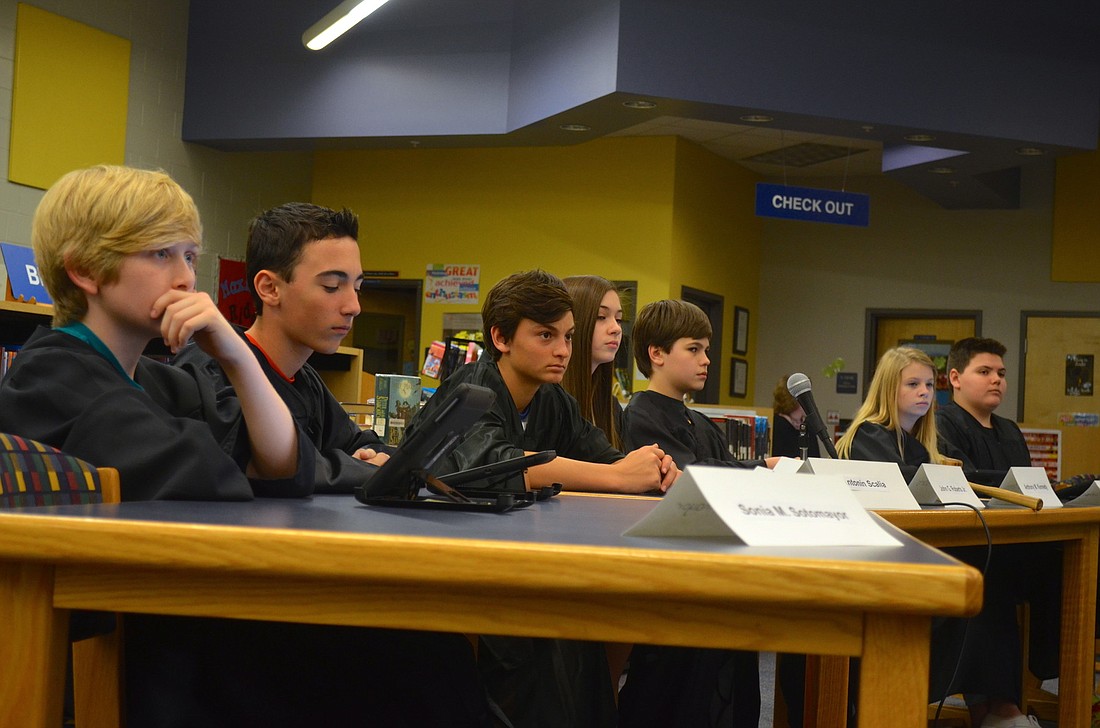- April 25, 2024
-
-
Loading

Loading

EAST COUNTY — With black gowns zipped over their clothes, seven 12- and 13-year-old Nolan Middle students tried to keep serious faces as they walked into the school’s media center last week.
They smiled at their classmates, who waited for the mock trial of the United States v. North Carolina case to begin Feb. 25.
Trading gavels for tablets and Washington, D.C.’s white-pillared Supreme Court building for an East County library, select students in Jaimi Lowe’s third- and fourth-period gifted civics classes each represented a different justice of the highest court in the country, with corresponding placards to prove it.
Lowe hopes the students take away more than just spending three weeks in the library.
“This has been a great review of application of the material we’ve covered in class so far,” Lowe said. “It brings real world views into the classroom and to life; it makes it relevant to them. I hope they take this with them, and it makes them more eager to participate with democracy in their adult lives.
“Often times, young people don’t see how politics are relevant to them,” she said. “But, it is. It affects their lives every day.”
After months of studying voting history and corresponding legislation, Lowe assigned her students the task of deciding the constitutionality of the Voter Information Verification Act. Should the legislation remain active, it would reduce the number of early voting days from 17 to 10, while eliminating same-day voter registration during the early voting period.
The act, which North Carolina Gov. Pat McCrory signed in August, is expected to take effect later this year. It requires individuals who vote to possess certain types of identification, all of which cost money to obtain.
“I learned a lot about the court process, and the judges’ political views,” student Ryan Katchen said of the experience.
Each student played a role in the three-day event.
Three students acted as the defense, and three others served on the prosecution team. Seven other students sat adjacent to the judges’ table and acted as the media by taking notes and asking follow-up questions post-trial.
Nine mock justices commanded the room. Each contributed questions to the group’s Google Docs spreadsheet, which justices used during the hearing.
Lowe, who served as the grand marshal for the proceedings, held a “Quiet” sign and only spoke occasionally to help the justices phrase questions to the defense and prosecution.
Individuals against the act equated the fees for identification cards to a poll tax, which the 24th Amendment to the U.S. Constitution made unconstitutional. The group said North Carolina created the idea to disenfranchise demographics of voters who can’t afford to purchase photo-bearing identifiers.
Advocates cited voter fraud as a motive for creating the legislation.
Lowe assisted 12-year-old Bryce Larkin, a justice who stumbled over asking how the act was unconstitutional. She focused on teaching her students the importance of respecting roles within the judicial system.
“Do you have any proof that people are actually denied the right to vote?,” Larkin asked.
Students took two-minute breaks to research answers to questions for which they didn’t have information.
Both classes agreed with the United States that the bill was unconstitutional. The third-period class ended with a 7-2 vote, and the fourth-period group finished with a 5-3 vote, with one justice absent. Despite being in New York on a family trip, Justice Antonin Scalia, played by Ryan Katchen, watched the reading of the verdict via FaceTime Feb. 27.
“The kids were very well prepared throughout the process, I thought,” Lowe said. “They really embodied their judges and took time to research, before and during the trial, to see the case through that justice’s political leanings, rather than their own.”
CASE SPECIFICS
The case: The United States v. North Carolina
Arguments: Prosecution — The act’s requirement for voter identification is unconstitutional because of the cost of obtaining driver’s licenses and other identifiers. Defense — The act would provide voter security by ensuring individuals at the polls are who they say.
Verdict: After deliberation, both classes ruled in favor of the United States.
Contact Amanda Sebastiano [email protected].